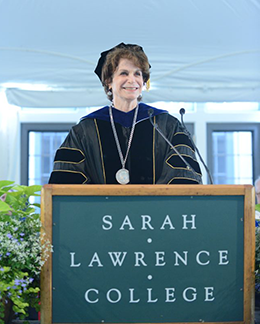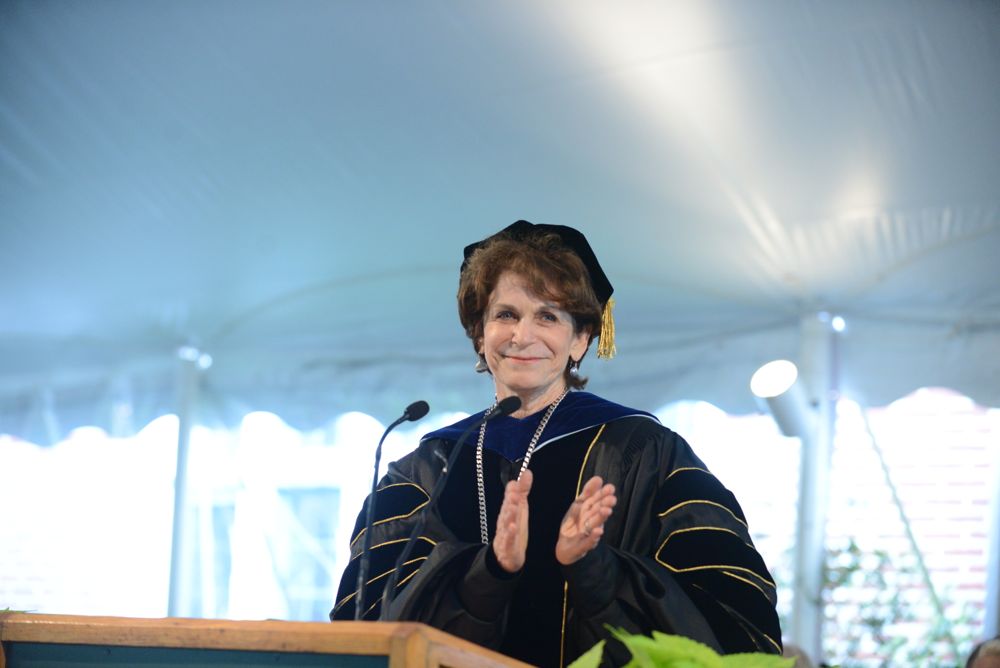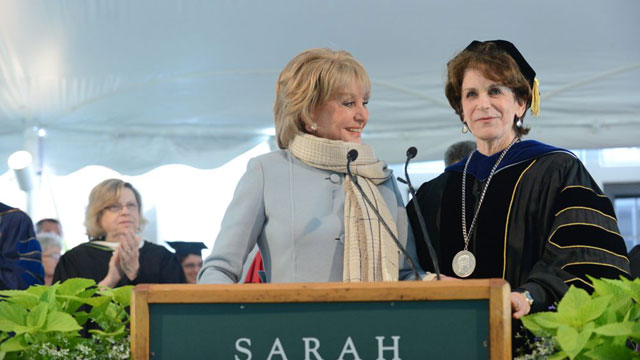 On behalf of the Trustees, faculty, and staff of Sarah Lawrence College, I am delighted to welcome you to the Commencement of the class of 2014. To the graduating class, let me say that we all have taken great pleasure in witnessing in you the “transformative” effect that Sarah Lawrence alumni identify as the legacy of their educations.
On behalf of the Trustees, faculty, and staff of Sarah Lawrence College, I am delighted to welcome you to the Commencement of the class of 2014. To the graduating class, let me say that we all have taken great pleasure in witnessing in you the “transformative” effect that Sarah Lawrence alumni identify as the legacy of their educations.
Along with our graduates, today we honor the family members in the audience, particularly the parents, whose love and commitment have supported our students. Ben Jonson, the seventeenth-century poet and playwright, called his child his “best piece of poetry.” To the parents here today, I want to tell you that over your daughter’s or son’s college career, we have done everything in our power to nurture the development of these precious products of your creativity and love. Members of the Class of 2014, would you please stand and recognize the family members and friends who have made this moment possible?
The rousing response the faculty receive when they process to the stage at Commencement is only the most audible sign of the great affection and gratitude our students feel toward their unparalleled teachers. Last year, I’m happy to remind you, the Princeton Review’s Best Colleges issue caught up with what the Sarah Lawrence community has recognized for years: that we have the most committed and best teachers within the landscape of American higher education today.
This devotion to the faculty has been amazingly consistent over generations of Sarah Lawrence students. It is probably the most common thread that ties Sarah Lawrence alumni together. What is sometimes less articulated, but, I believe no less true, is that faculty remain at Sarah Lawrence, often for their entire careers, because of the quality of the students and the faculty’s belief in the “common enterprise” students and faculty share here. In 1962, upon his retirement after nineteen years of teaching at Sarah Lawrence, the renowned literary scholar and editor Marc Slonim acknowledged that he had often been asked why he preferred this small college to more prestigious universities with more money, and he replied:
"I stuck to Sarah Lawrence College because I liked . . . and still like, what it stands for. I like a school where learning is a mutual process of give and take, and education is aimed at a better knowledge of life and of ourselves, where there is a constant search for different and more meaningful teaching methods, where students and teachers are aware of the rhythm of our era, of the movement of our society, of the development of our civilization . . . .I’m glad . . . that our image of the teacher is that of a friend and scholar and not of an official with a pointer in his hand and a rating ruler in his pocket. I like the feeling of a common enterprise, of a common effort the success of which depends on all of us—teachers and students in equal measure."
Today, six teaching faculty and two administrative faculty are retiring from Sarah Lawrence, having built much of their careers around the common enterprise that Marc Slonim embraced. They are leaving us with outsized legacies, beginning with the heart of our graduate programs, Dean Susan Guma.
And the best friend of all the many friends and lovers of the library, our academic librarian for the past twenty-five years, Sha Fagan.
 Love of that common enterprise is also shared by the six faculty members who are retiring this year. Yet each leaves a very singular imprint on generations of SLC students, through their words, images, meditations, elegant movement—that is, through their teaching, scholarship, and artistic creation: Angel Mosher, Ursula Schneider, Jean Wentworth, David Bernstein, Nancy Baker, and Emily Devine. Over the past few months, each has been honored in a different, and fitting, way by their colleagues and students, and in the character of each event, whether symposium or all-night dancing, their particular legacies were made manifest. How each encouraged students to take the kind of intellectual risks that lead to the transformative effect our alumni mention is perhaps best captured in the words of Nancy Baker in a memorable convocation speech she delivered to the community: “'Just doing it,' whether it be writing a paper, asking for criticism, speaking up in class, disagreeing with someone, trying out a new idea, is to take risks. It is to stand before the abyss and jump in. This is what we need to practice. . . . There is no institution that will allow you to practice that as much as this one. There is always a safety net. But knowing that there is—take full advantage of it. Go all the way in your risk-taking, so that later in life when there isn’t a safety net, you can live as if there were."
Love of that common enterprise is also shared by the six faculty members who are retiring this year. Yet each leaves a very singular imprint on generations of SLC students, through their words, images, meditations, elegant movement—that is, through their teaching, scholarship, and artistic creation: Angel Mosher, Ursula Schneider, Jean Wentworth, David Bernstein, Nancy Baker, and Emily Devine. Over the past few months, each has been honored in a different, and fitting, way by their colleagues and students, and in the character of each event, whether symposium or all-night dancing, their particular legacies were made manifest. How each encouraged students to take the kind of intellectual risks that lead to the transformative effect our alumni mention is perhaps best captured in the words of Nancy Baker in a memorable convocation speech she delivered to the community: “'Just doing it,' whether it be writing a paper, asking for criticism, speaking up in class, disagreeing with someone, trying out a new idea, is to take risks. It is to stand before the abyss and jump in. This is what we need to practice. . . . There is no institution that will allow you to practice that as much as this one. There is always a safety net. But knowing that there is—take full advantage of it. Go all the way in your risk-taking, so that later in life when there isn’t a safety net, you can live as if there were."
Many of our alumni have learned this lesson. In fact, in very different forms, their own legacies in the world reflect this risk-taking, this passionate pursuit, this fearlessness. Last week, on the occasion of her retirement, one of our best-known trailblazers had a spectacular send-off and very public party. At Barbara Walters’s retirement party, the guest list was formidable, the event went on for days, and a few of our own SLC students even got to be part of the surprise. Through it all, what was clear was that from her beginning in broadcast news, this pioneer had the courage to perform without a safety net in front of millions. And the women journalists who paid tribute to her stamina left no doubt that they were indeed Barbara’s legacy. Barbara Walters has said that Sarah Lawrence College taught her not to be afraid to ask questions. She has built quite a career on that lesson.
 In saluting the soon-to be graduates of the class of 2014 and before welcoming our renowned Commencement speaker, journalist and news analyst Fareed Zakaria, it is particularly fitting that I announce that Barbara Walters has agreed to donate her archive—of tapes, transcripts, photographs, and papers—to her alma mater, Sarah Lawrence College, to establish the Barbara Walters Archive. We are thrilled by this new gift from our extraordinary alumna so that her legacy can be shared with students, scholars, and beyond. Members of the Sarah Lawrence community, would you please join me in acknowledging this honor; in fact, would you please join me in welcoming Barbara Walters to the stage!
In saluting the soon-to be graduates of the class of 2014 and before welcoming our renowned Commencement speaker, journalist and news analyst Fareed Zakaria, it is particularly fitting that I announce that Barbara Walters has agreed to donate her archive—of tapes, transcripts, photographs, and papers—to her alma mater, Sarah Lawrence College, to establish the Barbara Walters Archive. We are thrilled by this new gift from our extraordinary alumna so that her legacy can be shared with students, scholars, and beyond. Members of the Sarah Lawrence community, would you please join me in acknowledging this honor; in fact, would you please join me in welcoming Barbara Walters to the stage!
Barbara Walters
How lovely to see you. When I attended Sarah Lawrence, there was a wonderful professor who became world-renowned, his name was Joseph Campbell. And what he told us—and what he hoped we would remember—was to “follow our bliss.” I have to tell you that when I left Sarah Lawrence, I had no idea what my bliss was. So if you are like me and you have no idea what your bliss is, get a job! I promise you that bliss will come. So some years ago, I had the opportunity to interview Vladimir Putin, and after I asked him a number of foreign policy questions, which he expected, I guess, I asked my last question. If you have to do a list of questions and you’re worried about the toughest one, make it the last in case he walks out, okay? So my last question was, “As a member of the KGB, have you ever killed anyone?” Don’t ask this of everyone. And by the way, he said, “No, that was not my department.” So later, several people said, “Where did you get the nerve to ask a question like that?” And I said, “It’s easy. I went to a college where I was not afraid to ask questions.” And this is that college, and that is my contribution to world peace. So I thank Sarah Lawrence for it. I have been asking questions ever since my graduation and this is one more chance today to wish all of you a wonderful, fulfilling life, and to say thank you to this college I love.